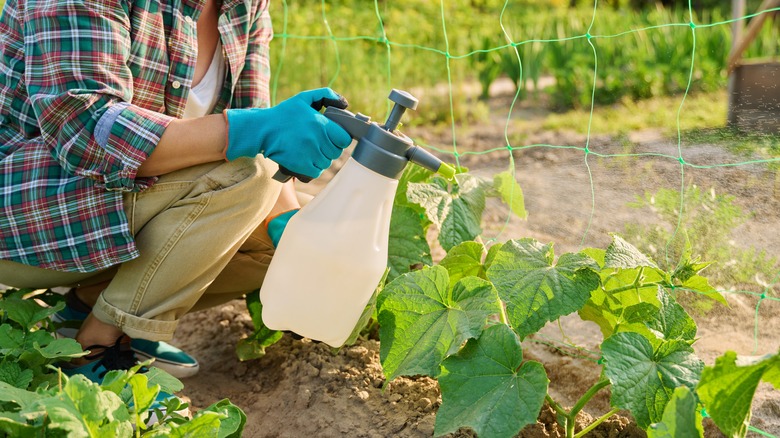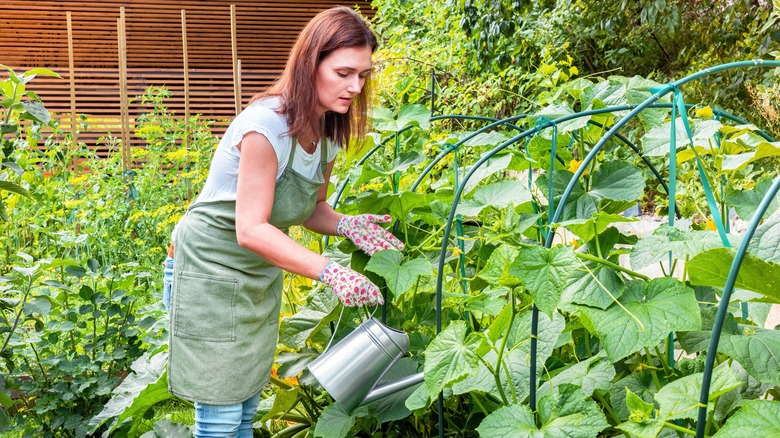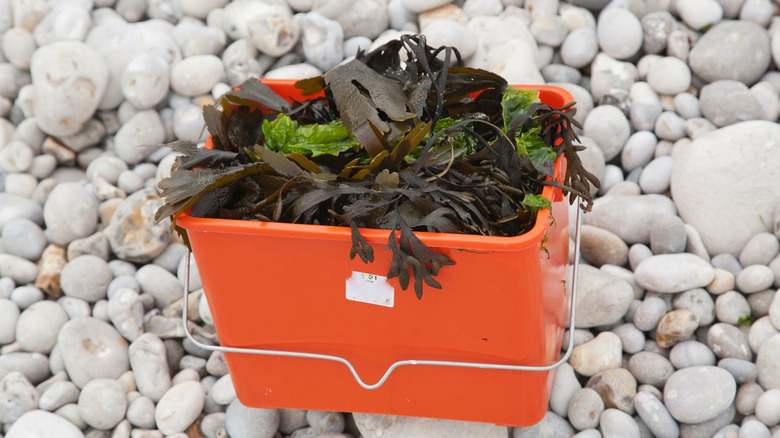Tiktok's Ocean-Inspired Fertilizer Promises A Healthy Garden, But Is It Worth It?
While you've been browsing TikTok for handy ideas to create a healthy and thriving garden, you might have come across one that shows you how to use an ocean-inspired fertilizer to enhance your plant's growth. The secret ingredient in this home-made fertilizer is dried seaweed. The dried seaweed is boiled in water and then the water is strained to make seaweed tea. This tea is then added to a spray bottle and mixed with water. The diluted mixture is used as a foliar spray for plants in the garden.
Seaweed tea is actually a great tonic for your garden and is one of the best DIY fertilizer teas you can make to nourish your garden, along with nettle tea, yarrow tea, borage tea, comfrey tea, and even banana skin tea. Apart from making your own tea, seaweed extract is available in many commercially available concentrations that you can easily mix with water and add to your garden plants. Seaweed provides numerous benefits to your plants and, more importantly, the soil in which the plants are growing. Seaweed extract or tea is also useful for protecting your garden in a heatwave because it helps plants to retain moisture.
Why is seaweed so good for your garden?
One of the prime ways that seaweed can benefit your garden is as a soil conditioner. It helps to stimulate the microbial activity in the soil, which, in turn, makes nutrients more readily available to plants. It should be noted that, although seaweed does contain minerals and, often, small amounts of nutrients such as nitrogen, phosphorus, and potassium, it's not regarded as a complete fertilizer. For example, a popular commercially available seaweed extract – Kelp-It SP – has a nutrient NPK ratio of 0-0-18. This means it contains no nitrogen or phosphorus but does contain 18% potassium. In NPK ratios, the N stands for nitrogen, P refers to phosphorus, and K stands for potassium.
Seaweed is a very valuable source of trace minerals that it absorbs from the seawater it grows in. These trace minerals such as iron, zinc, and magnesium, are vital for healthy plant growth. Seaweed is also rich in sulfur, which can be beneficial for improving heavy clay soils. It's also interesting to note that the polysaccharides present in seaweed can help to not only stimulate plant growth but also strengthen the plant's defenses against fungal and bacterial diseases. It's no wonder that most commercially available seaweed extracts are commonly referred to as plant tonics. In fact, you might be interested to learn that there are many benefits to spraying your citrus trees with seaweed extract.
How you can make your own seaweed tea for your garden
While it's perfectly acceptable to use dried edible seaweed to make your own seaweed tonic for your garden, you can also use seaweed gathered from the beach. Just make sure to check with the local authorities to make sure this is allowed. There's conflicting evidence as to whether you should wash the seaweed to remove salts because some of the salty taste attributed to seaweed products is actually potassium salts rather than sodium. And, potassium is good for plant growth as well as fruit and flower production.
To make seaweed tea, all you need is a bucket and some water. Immerse the seaweed in the water and let it soak for several weeks. Once the water has absorbed the nutrients from the seaweed – you'll notice a distinct color change in the water – just strain off the liquid and use it to water the soil around your plants. Or, you can put it into a spray bottle to spray your plants. Dilute the seaweed tea with water at a ratio of one part seaweed extract to two parts water if you want to use it as a foliar spray. If you don't have easy access to a beach, you might want to visit your local fish market as seaweed is often used to pack around freshly caught seafood and the retailers might be willing to give you some once they've finished with it.


